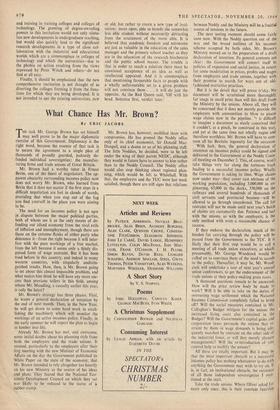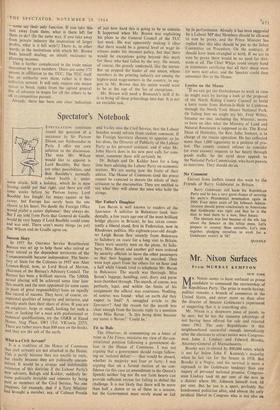What Chance Has Mr. Brown?
By ERIC JACOBS
THE task Mr. George Brown has set himself
may well prove to be the major diplomatic exercise of this Government. Diplomacy is the right word, because the essence of that task is to secure the agreement to a single plan of thousands of proudly guarded, jealously de- fended individual sovereignties: the manufac- turing firms and trade unions of Great Britain.
Mr. Brown had a worthy tutor in Ernest Bevin, one of the finest of negotiators. The ap- parent obscurity surrounding incomes policy now does not worry Mr. Brown, who learned from Bevin that it does not matter if the first steps in a difficult negotiation are lost in clouds of words, providing that when you step out of the fog you find yourself in the place you were aiming to be.
The need for an incomes policy is not npw in dispute between the major political parties, both of whom see it as the only means of de- fending our island economy from the rival evils of inflation and unemployment, though there are those on the extreme flanks of either party who denounce it—from the right because it will inter- fere with the pure workings of a free market, from the left because it seems only a thinly dis- guised form of wage restraint. But it has been tried before in this country, and indeed in many western countries, with singularly undistin- guished results. How, then, is Mr. Brown going to set about this almost impossible problem, and what makes him think he will have any more suc- cess than previous toilers in this field, among whom Mr. Maudling, a casualty earlier this year, is only the latest?
Mr. Brown's strategy has three phases. First, he wants a general declaration of intention by the end of next month. Then, in the New Year, he will get down to some hard work in estab- lishing the machinery which will monitor the workings of an active incomes policy. Finally, in the early summer he will expect the plan to begin to lumber into life.
Already Mr. Brown has met, and overcome, some initial doubts about his planning style from both the employers and the trade unions. It seemed, particularly to the employers after their firs, meeting with the new Minister of Economic Affairs on the day the Government published its White Paper on the state of the economy, that Mr. Brown intended to rely altogether too heavily on his new Ministry as the source of his ideas and plans. They feared that the National Eco- nomic Development Council on which they sat was likely to be reduced to the status of a rubber-stamp. Mr. Brown has, however, mollified them with compromise. He has pruned the Neddy office only of its chief economist, Sir Donald Mac- Dougall, and a dozen or so of his planning staff. The little Neddies, he decided, were to be left under the wing of their parent NEDC, although they would in future have to answer to him rather than to the Neddy Council. The Neddy office would also stop thinking about regional plan- ning, which would be left to Whitehall. With that, the employers and the TUC were last week satisfied, though there are still signs that relations between Neddy and the Ministry will be a fruitful source of tensions in the future.
The next testing moment should come fairly soon now. With the Neddy question out of the way and the broad outlines of his incomes scheme accepted by both sides, Mr. Brown's Ministry moved on to the preparation of a draft declaration of intention. Its general contents are clear: the Government will commit itself to policies of expansion and social justice, in return for some moderation in prices, profits and wages from employers and trade unions, together with their promise to search for ways out of old- fashioned restrictive practices.
But it is the detail that will prove trtcky. No document will be scrutinised more thoroughly for snags in small print than will this draft from the Ministry by the unions. Above all, they will be concerned that it does not merely provide the employers with ammunition to blow to pieces wage claims now in the pipeline. 't is difficult to imagine a document so nicely conceived that it couldn't, at a pinch, be construed in this waY, and yet at the same time not wholly vague and therefore worthless. Mr. Brown will have to sum- mon all his Bevinite ingenuity for the occasion.
With luck, then, the general declaration of intention on incomes policy could be signed and delivered to the Government at the Neddy Coun- cil meeting on December 2. This, of course, won't take things very far along the tortuous track leading to a successful incomes policy. Wisely, the Government is taking its time. Wage claims now under way—they cover vast sections of the working population, including 3,000,000 in en- gineering, 65,000 in the docks, 330,000 on the railways and several hundreds of thousands of civil servants and provincial busmen—will be allowed to go through unmolested. The call for restraint will not be made until next year's batch of claims are customarily due. Patience and tact with the unions, as with the employers, is the only method with even a reasonable chance of success.
If they endorse the declaration, much of the harden for carrying through the policy will be passed from the Government to the TUC. It is likely that their first step would be to call a meeting of all trade union executives, at which-, presumably, Mr. George Woodcock would be called on to convince, them of the need to accede to the policy. Thereafter, it may be, Mr. Wood- cock will undertake a tour of next year's annual union conferences, to get the endorsement of the trade unions at their policy-making grass roots. A thousand questions remain to be answered. How will the price review body be made to work? Will it be able to take on the duties of overseeing wage settlement which the National Incomes Commission completely failed to bring off? Will -the social measures contained in Mr. Callaghan's Budget mitigate for the unions the increased living costs also contained in the Budget? Will the Government's capital gains and corporation taxes persuade the unions that re' straint by them in wage demands is being ade- quately matched by restraint on the other side of the industrial fence, or will they merely alienate managements? Will the re-introduction of rent control help to mollify the unions?
All these are vitally important. But it may be that the most important obstacle to a successful incomes policy has nothing whatsoever to do with anything the Government may wish to try on. It is, in fact, an institutional obstacle, the existence of all those independent sovereignties I men- tioned at the start.
Take the trade unions. Where Oliver asked for more only once, this is their constant function
—some say their only function. If you take this task away from them, what is there left for them to do? (In the same way, if you take away from private industry the inspiration of larger profits, what is it left with?) There is, in other words, in the institutions with which Mr. Brown finds himself dealing, an inbuilt resistance to Planning incomes.
This is further complicated in the trade union movement by pure numbers. There are some 175 unions in affiliation to the TUC. The TUC itself has no authority over them, rather is it their collective servant. It will only require one major union to break ranks from the agreed general line of advance in wages for all the others to be oil in competitive pursuit.
Already, there has been one clear indication of just how hard this is going to be to contain. It happened when Mr. Brown was explaining his plans to the General Council of the TUC last week. He was apparently making it clear that there would be a general level of wage in- creases under his incomes policy, but that there would be exceptions going beyond this mark for those who had fallen by the way. He meant, of course, the grossly underpaid, like the nurses. But up popped the leader of one union, whose members in the printing industry are among the highest-paid wage-earners in the country, to sug- gest to Mr. Brown that his union would want to be at the top of the list of exceptions.
Mr. Brown will need a Bismarck's skill if he is to bring all these princelings into line. It is not an enviable task.



































 Previous page
Previous page